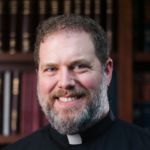
Ezekiel’s meditation on God as the shepherd continues a recurring note over the last several weeks on leadership. For this prophet, and in this particular moment, the future realization of God’s promises involves the direct “shepherding” of the people by God. This is, after all, what seems to have been the original intention, when God first made a covenant with his chosen people. It was only due to their stubbornness and hardness of heart that he gave them a king. And in David that kingship took on its own significance, since God made a covenant with David, giving him an eternal throne.
When one reads the prophets, the question emerges: how can there be one shepherd, God, when there is also going to be a king forever from the line of David? We now know the answer: Christ himself is the Davidic king. He is also God.
In the Old Testament there were three primary offices instituted by anointing. Prophets were anointed, as a sign of their appointment to speak on God’s behalf to the people. Priests were anointed, as a sign of their role in offering sacrifices to maintain fellowship between people and God. And kings were anointed, a sign of their role in governing God’s people on earth.
The word Messiah in Hebrew, Christ in Greek, means “anointed one.” And so the early Church thought it quite clear that in assuming this role of the Messiah, the Christ, Jesus was true prophet, priest, and king—and it was important that he be all three. For a king alone would rule but would not reconcile. A priest alone would reconcile without giving order. A prophet alone would speak truth without giving the power to live in it. Christ our Lord is the fulfilment of all these roles: as prophet, he proclaims the truth of God’s kingdom; as priest, he reconciles us to God; as king, he empowers us to live a life of justice and virtue.
The Catechism of the Catholic Church, following ancient tradition, insists that in baptism we receive in some sense all three of these roles as we are incorporated into the body of Christ. As prophets we are given the mission to proclaim in word and deed the truth of God’s kingdom in the world. As priests we are asked to intercede for the world and reconcile it to God. In this sense, the priesthood of the whole Church and the ministerial priesthood are two sides to the same coin, ordered to one another.
But how do we embody the kingly ministry of Christ? To be sure, this is a difficult question. For Catholics, the kingly ministry of Christ’s Church is hard to separate, historically, from the political power of the papacy in Europe until very recently—exemplified, perhaps, by that triple-tiara of the popes that was abandoned, controversially, in 1963, and which in part represented the temporal power of popes as not just ecclesiastical rule, but secular monarchs of a sort. That is an interesting can of worms for another day.
The Fathers of the Church, along with the medieval commentators and our current Catechism, seem pretty clear in their view that the kingly power of Christ is exercised, at least among the faithful, primarily by their reign over their own bodies. In other words, we exercise Christ’s kingly reign by ruling over our own passions and desires, by regulating our selves and forming our actions according to virtue rather than vice.
To be clear, this is not to denounce or delegitimize the various ways that the Church has, through the ages, exerted her power in the temporal realm. That has been, I think, sometimes for good, sometimes not. But ultimately it is a prudential matter, accidental to the essence of what the Church is. Whether or not the Church is in charge of the world, Christians show that Christ is Lord by their lives. They worship Christ the King not by coercing others to his rule, but by living in such a way that his rule is a necessary conclusion, an inescapable reality.
Perhaps this is why the Gospel for today emphasizes charity. Christ’s kingly ministry is exercised most not in dominance or power, but in lowly service—“as you did it to one of the least of these my brethren, you did it to me.” And this should come as no surprise, for this is the witness he gives us at even such a moment of power and grace as the Last Supper, when, before he institutes the Eucharist, he washes his disciples’ feet. And at this point we ought to just go all the way and remember that Christ is king, most decisively, on the Cross. That is his throne in this world. And it is from that throne, that seat of glory, that he most clearly shows the character of his rule, which is ultimately a rule of love. He would rather die than let us be, as our collect for today reminds us, “divided and enslaved by sin.”
Here’s the thing: the “freedom” of this world, the ability to do what we want, when we want—it’s all a delusion to the extent that it veils the reality of sin and death. Our world is under judgment—and it has been since AD 33. However good and noble America is, however good and free any other good nation might be, such states, modern or medieval or ancient, cannot ultimately provide the freedom that God ordained for us, because that freedom is not simply the indifferent ability to choose what kind of ice cream we want or whom we want to be our president, but the freedom to live the life of abundance in fellowship with the God who made us and loves us.
Thus, that early Christian proclamation—that Jesus is Lord—is a political statement. Not political as in staking a claim within the existing politics of this world, but offering an alternative politics, an alternative polis, which is the City of God. And the saints and Fathers of the Church insist, in every age, that no earthly city, no earthly state, can offer the fullness of what that kingdom holds.
This does not mean that we withdraw or act as if we are not part of the earthly city. Christianity is not an escape from reality. But we live here as citizens of another realm. And our mission is not first to control or to manage this realm, but to give witness to another.
I’m always struck by the strangeness of the title of today’s feast: Jesus Christ, King of the Universe. What an unusual thing to say. But surely this is an even more unusual thing, in 2023, to live. And so as we celebrate the Mass, and as we carry our Lord himself in procession by the street, remember that strangeness. From a pagan perspective, we are about to walk around singing praises to a wafer. But I’d like to think that the weirdness of such things is exactly how we remind the world that all is not as it seems. There is, in fact, a Lord of history. There is an order and a meaning to this world. And we know that the only access point to that ultimate reality is Jesus Christ, who will in the end unite us all under his “most gracious rule.”



